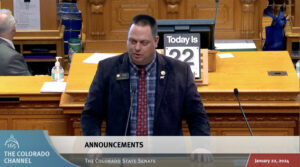The Colorado Department of Transportation will be able to charge both initial and annual fees to telecommunications firms laying broadband fiber in highway right-of-way areas, after a Senate committee rejected an attempt by rural and business interests to stop that practice.
Senate Bill 91, sponsored by Republican Sen. Byron Pelton of Sterling and Democratic Sen. Kyle Mullica of Federal Heights, was a response to December’s Colorado Transportation Commission vote to develop a fee structure for using state-owned land beside roadways. Previously, the state had sought in-kind contributions from telecom firms looking to connect communities via rights of way, from agreements to lay CDOT fiber simultaneously with theirs to offers of contributing other infrastructure needed by the state.
While governments charging companies for access to public land is not an unusual practice, two things bothered industry leaders and local-government officials about the newly developed fee program. They didn’t like annually recurring fees being added onto more standard one-time permitting fees, and they felt the added costs would work against Gov. Jared Polis’ push to extend broadband to 99% of the state with the aid of $826 million in one-time federal funds.
How the right-of-way bill came about
So, leaders from Colorado Counties Inc. and firms serving rural districts like Pelton’s approached him with what they felt was a middle-ground position. SB 91 sought to allow CDOT to charge a permitting fee to right-of-way use applicants so long as it doesn’t exceed the department’s cost in administering the permit but prohibit it from imposing any other right-of-way fees for the deployment of broadband.
That would have upended the CTC-approved plan to charge five cents per foot of fiber for a permitting fee and then annual fees of three cents per foot in rural counties or 10 cents per foot in urban counties. Department leaders said when instituting the fee that the money is needed both to maintain the rights of way where the fiber would be laid and to achieve the fair-market value on the land that they’re required to procure.

Colorado state Sen. Bryon Pelton speaks in the Senate earlier in the 2024 legislative session.
Pelton told the Senate Transportation & Energy Committee that while the fees may seem reasonable, they could add tens of thousands of dollars to the cost of extending broadband to remote areas — costs that would fall on the residents and businesses of those places. Providing broadband service that people couldn’t afford would defeat the purpose of heavy federal investment, which Polis has framed as an economic-development issue aiding businesses and remote workers in parts of the state that have yet to see a job boom.
Impact of right-of-way fees on remote communities
John Saunders, chief business development officer for La Junta-based internet service provider SECOM, cited the Las Animas County town of Branson as an example for why the state needs to limit costs for using rights of way to get fiber to far-flung areas. With the approved fees, it would cost the 36 households there an average of $34 per month to cover the fees of running infrastructure into the town 50 miles southeast of Trinidad — a heavy burden for residents who make average annual wages of $27,000.
“With these fees, those folks will never get broadband,” Saunders said.
Allie Axley, CDOT’s information transportation systems branch manager, noted, however, that after pushback on the initially proposed size of the fees, the department rethought its methodology twice and brought them down more than 90% from its initial proposal. It’s processed 56 permits under the new fee structure and plans to collect an average of just $150 in annual fees per permit next year, CDOT legislative liaison Emily Haddaway added.
In addition to pushing back on the idea that the fees are excessive — Haddaway noted that bill proponents’ oft-cited estimate of costing $11,000 a year to run fiber from Trinidad to Kim is an outlier because it’s a 71-mile stretch — officials called it ideologically wrong. Telecom companies are private, typically for-profit entities who are not regulated like public utilities and thus do not merit the free use of rights of way that CDOT grants to such utilities, both CDOT leaders and bill opponents like Sen. Kevin Priola said.
State’s role in managing assets like right-of-way streteches

Colorado state Sen. Kevin Priola discusses bills in his office earlier this session.
Priola, D-Henderson, noted that the Joint Technology Committee on which he sits considered running a bill to govern fees — until it realized that the reduced-fees proposal the CTC approved may not even lead to the recovery of costs for the program, he said. Blocking the recurring fees could create problems if the rights of way or fiber within them must be moved at cost, and the governor-appointed commission housed within the department was within its right to charge firms for using public assets, he said.
“I’m confident that the current proposal by CDOT strikes the right balance,” Priola said just before casting the deciding vote against SB 91. “At the end of the day, industry can’t cost-shift on Colorado to the point where it doesn’t pencil out.”
Committee members defeated the bill by a 4-3 margin, with Democratic Sen. Tony Exum of Colorado Springs joining committee Republicans Pelton and Sen. Cleave Simpson of Alamosa in backing SB 91.
Next steps in broadband deployment
The Colorado Broadband Office is in the process of determining how to distribute the $826 million in Broadband, Equity, Access and Deployment (BEAD) money that many state officials expect to be the last major pot of federal funds given to expand connectivity. State and federal leaders said last year that they hope to distribute many of the funds to smaller, local companies and to local governments to install the fiber and service the rural communities, believing they are in better position to handle such unique jobs.
Meanwhile, the office is opposing another bill, House Bill 1245, that is advancing through the legislative process and that would require any contractors receiving the grants to pay prevailing wages to workers — a hefty proposition for some small firms in low-cost areas.
State officials must get federal signoff on their spending plans, and they’ve told legislators that adjusting their proposals to reflect the higher labor costs mandated by HB 1245 would delay the National Telecommunication and Information Administration’s consideration of their plans and thus slow broadband expansion. Cosponsoring Rep. Tammy Story, D-Conifer, has told two committees, however, that other government officials relayed to her that getting such changes in quickly would not cause the state to lose its place in line for proposal consideration.
HB 1245 advanced out of the House Appropriations Committee Wednesday on a Democratic-led party-line vote and is set for debate in the full House this week. The session must adjourn by May 8.
